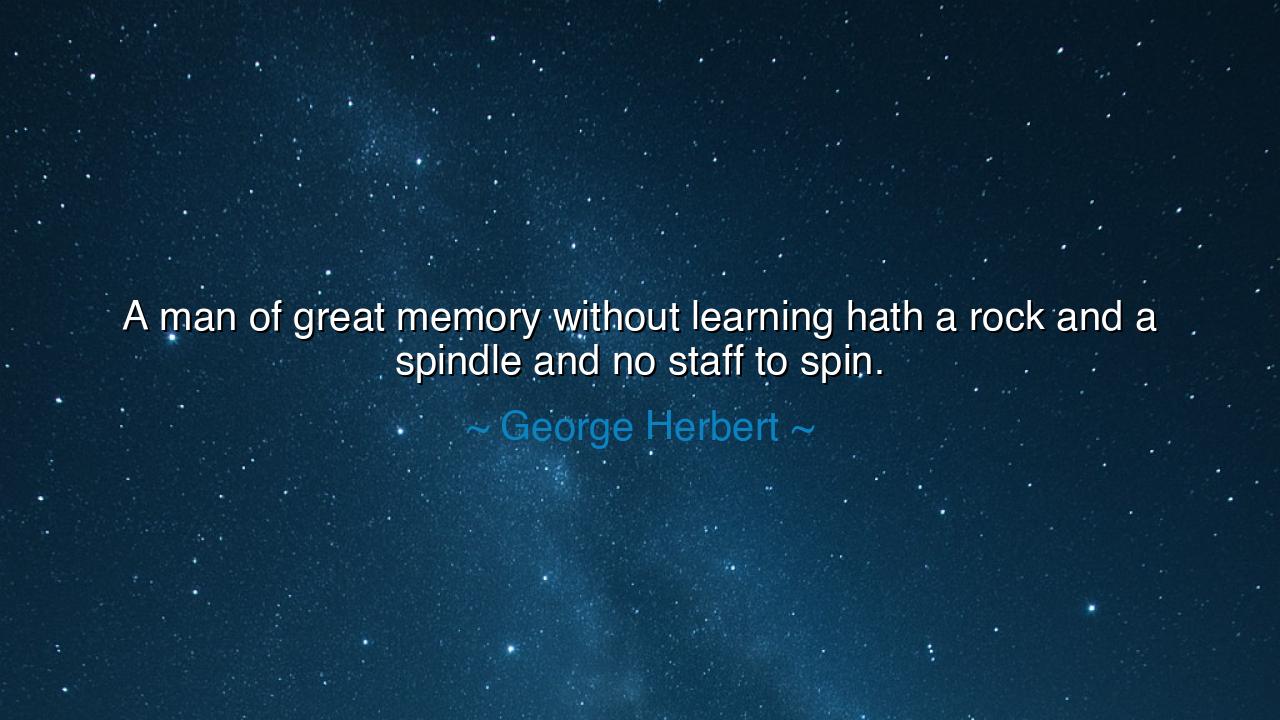
A man of great memory without learning hath a rock and a spindle






When George Herbert wrote, “A man of great memory without learning hath a rock and a spindle and no staff to spin,” he offered a parable of the mind—one that echoes across centuries as both a warning and a call to wisdom. In his time, as in ours, men admired those who could recall much, who could recite poems, names, and histories by heart. Yet Herbert, a poet-priest and philosopher, saw deeper. He knew that memory without understanding is like raw wool in the hands of one who does not know how to weave—it is potential without purpose, abundance without direction. He likened such a man to one who has “a rock and a spindle,” the tools of creation, yet lacks the staff to spin—the knowledge, the art, the discipline that turns chaos into form.
In ancient days, the art of spinning was sacred. Women at their wheels and shepherds by their flocks turned simple fiber into garments that warmed kings and peasants alike. Herbert drew upon this image not for its craft, but for its symbolism: that knowledge is the thread that binds memory into wisdom. To remember facts without understanding them is to hold the raw material of greatness but never fashion it into something of worth. A rock may anchor, a spindle may twist, but without the guiding staff, the hands move in vain. So too does the unlearned mind—filled with facts yet empty of comprehension—wander in circles, mistaking recollection for mastery.
The meaning of Herbert’s words becomes clear when we look to history’s examples. Think of Alexandria, that glorious city of learning, whose library held the sum of human knowledge. It was said that within its walls were scrolls containing every art, every science, every philosophy known to man. Yet when flames consumed it, all that memory turned to smoke. But what survived were not the scrolls—but the minds that understood their meaning, the scholars who carried the essence of wisdom in their hearts. From them, knowledge lived on. The lesson is eternal: the memory of words is fragile; only the understanding of truth endures.
Many men mistake recall for wisdom. They hoard facts as misers hoard gold, yet neither can spend it rightly. The wise, however, are like craftsmen—they take what memory gives and shape it into insight, using the tools of learning, reflection, and humility. A mind that remembers but does not think is like a great library whose doors are locked. Herbert saw this clearly: memory is the servant of learning, not its master. Without learning, memory cannot guide the soul; it can only echo the voices of others. But when joined with learning, it becomes the foundation upon which wisdom builds its temple.
Consider Leonardo da Vinci, whose notebooks overflowed with sketches, formulas, and observations. His genius was not in memory alone—many men could have written what he saw—but in the alchemy of understanding. He looked upon the flight of birds and discerned the secret of motion; he studied anatomy and found beauty in structure. Memory gathered his facts, but learning transformed them into creation. Thus was born the man who bridged art and science, turning mere recollection into revelation. Herbert’s words could well have been his guide: it is not what the mind stores, but how the soul uses it that defines greatness.
There is also a spiritual truth within Herbert’s wisdom. For he was, above all, a man of faith who saw the human mind as both gift and responsibility. To him, memory without learning was not just ignorance—it was waste, the neglect of divine potential. The Creator gave man reason so that memory might find purpose, and experience might yield wisdom. The rock and spindle are the materials of creation; the staff to spin is the grace of discernment. Without it, even the most brilliant mind is but a field of untended grain, abundant but fruitless.
Let this teaching be passed down: Do not boast of what you can recall, but of what you can understand. Gather knowledge as one gathers wool, but do not stop there—learn the art of spinning it into wisdom. Read not merely to remember, but to reflect; listen not merely to repeat, but to discern. Let your learning be the staff that guides your memory’s labor, turning thought into truth and recollection into revelation. For only then will your mind cease to be a storehouse of others’ words and become, instead, a loom that weaves the fabric of your own wisdom.
And so, my children of tomorrow, remember Herbert’s ancient counsel: memory is the stone, learning the hand, and wisdom the cloth. Without the union of all three, the mind’s wealth lies barren. But when they work together, they clothe the spirit in understanding, and from that cloth is cut the garment of greatness—fit for those who would not only know the world, but truly comprehend it.






AAdministratorAdministrator
Welcome, honored guests. Please leave a comment, we will respond soon